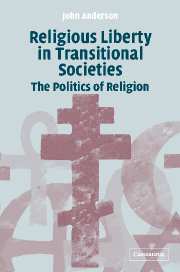Book contents
- Frontmatter
- Contents
- Preface
- 1 Introduction
- 2 Southern Europe: Spain and Greece
- 3 Central and Eastern Europe: Poland and Bulgaria
- 4 The former USSR: Russia and the successor states
- 5 Justifying religious ‘recognition’ and/or discrimination
- 6 Conclusion: culture, conflict, modernisation and religious liberty
- Select bibliography
- Index
1 - Introduction
Published online by Cambridge University Press: 22 September 2009
- Frontmatter
- Contents
- Preface
- 1 Introduction
- 2 Southern Europe: Spain and Greece
- 3 Central and Eastern Europe: Poland and Bulgaria
- 4 The former USSR: Russia and the successor states
- 5 Justifying religious ‘recognition’ and/or discrimination
- 6 Conclusion: culture, conflict, modernisation and religious liberty
- Select bibliography
- Index
Summary
In the summer of 1997 the State Duma of the Russian Federation adopted a law ‘on freedom of conscience and religious organisation’ that, after a brief delay, was signed into law by Boris Yeltsin on 26 September. Whereas the law on religion approved in 1991 had effectively created a religious free market in Russia, the new law differentiated amongst religious communities with regard to both their symbolic status and legal rights.
As the Russian text was awaiting the final presidential signature, the author of these lines was in Kyrgyzstan researching the growth of civil society in this newly independent Central Asian republic. Following an interview with the state commissioner for religious affairs he held a conversation with some relatively liberal-minded intellectuals who argued very strongly that the religious sphere could not be one of absolute freedom and that some degree of legal regulation and even restriction was essential.
In both of these countries the discussion of new regulatory frameworks for religious institutions revolved around issues of stability, vulnerability, unfair competition, a desire for order, and questions of national identity. In Kyrgyzstan the argument suggested that here was a fragile society that had only recently achieved independence, and which had since experienced a veritable onslaught by religious and missionary organisations of all sorts. On the one hand there were Muslim purists who wanted to impose their version of the true faith on a society that, whilst retaining a strong cultural attachment to religion, had also been deeply affected by decades of Soviet secularisation – and my colleagues cited above were all urban, educated women, suspicious of Islamicist motives.
- Type
- Chapter
- Information
- Religious Liberty in Transitional SocietiesThe Politics of Religion, pp. 1 - 25Publisher: Cambridge University PressPrint publication year: 2003



